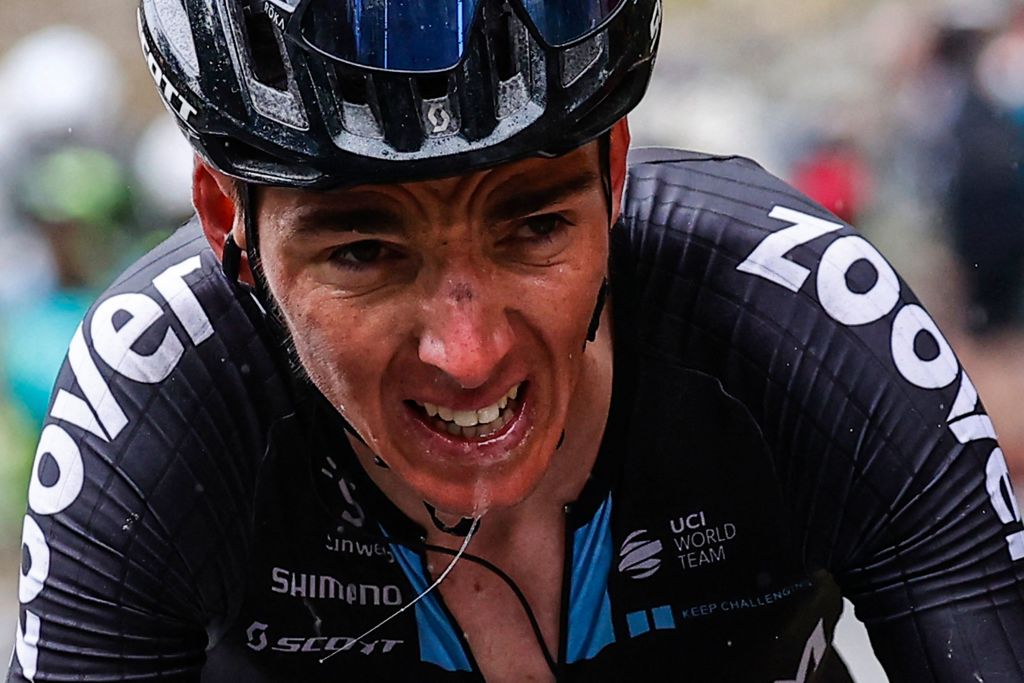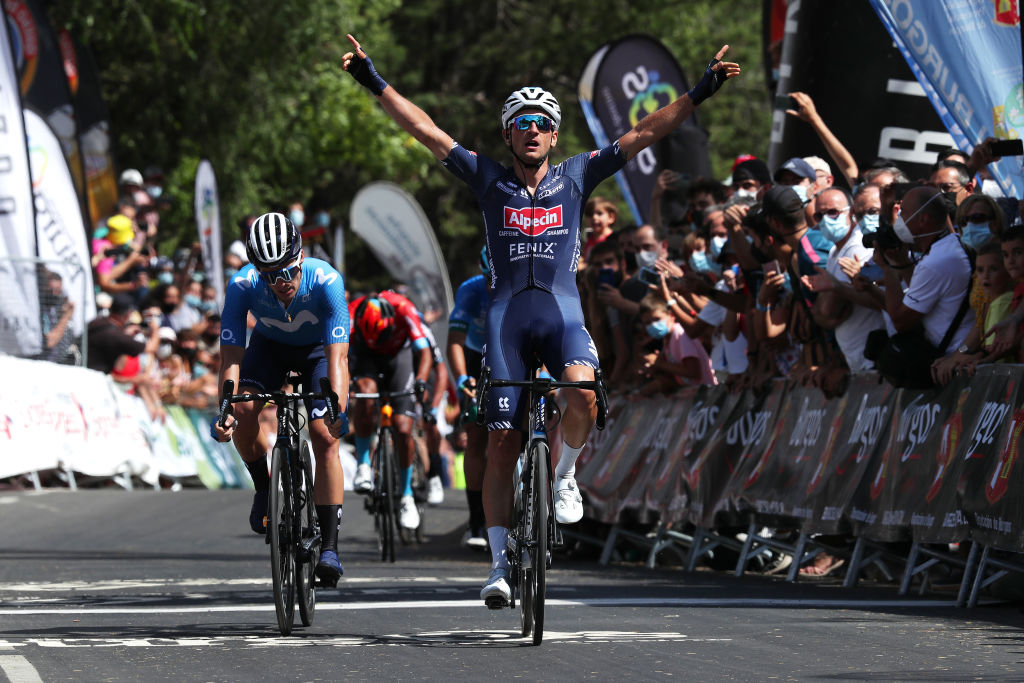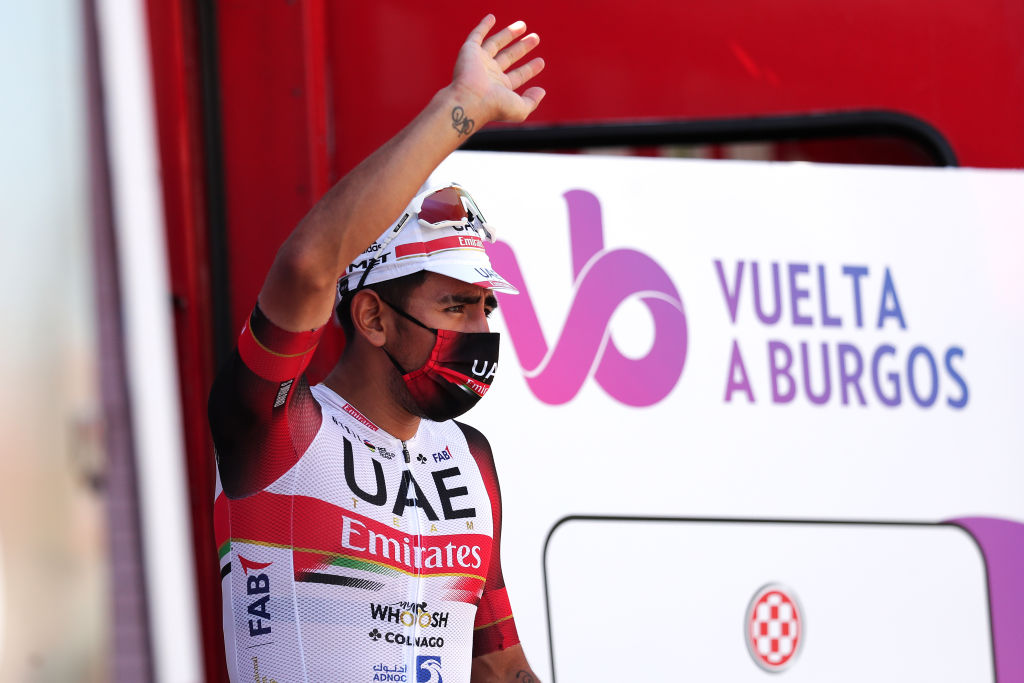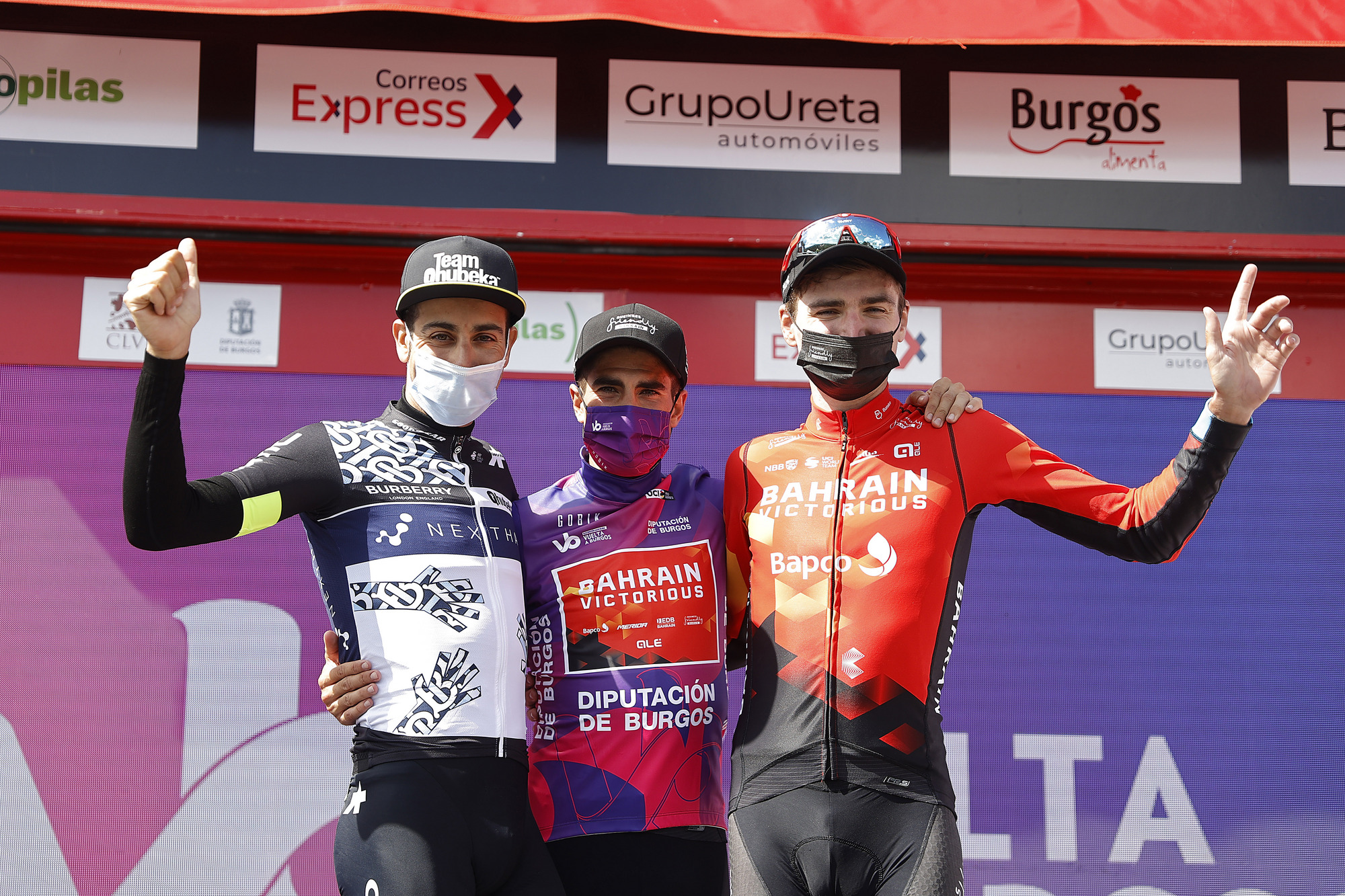Vuelta a Burgos: From a jarring start to blood in the water
The final build-up race before the Vuelta a Espana saw Mikel Landa snatch victory from a suffering Romain Bardet

With nineteen kilometres left to go in the first stage of the 2021 Vuelta a Burgos, the unthinkable happened to the Ineos Grenadiers. It was one of those events that simply transpired, suddenly, without warning. One moment, the race was quick-paced but progressing smoothly, gliding through without a hitch among the hay fields, and then, in a matter of seconds, carnage.
There were crosswinds, a fight for the front, perhaps a touch of wheels, any number of potential reasons. Still, Egan Bernal and Adam Yates, two of the Ineos GC hopefuls, went down and stayed down for a considerable time. No one knew how it transpired, the television cameras where somewhere else entirely.
The seconds ticked by, ten, fifteen, twenty, and Bahrain Victorious, sensing blood in the water, did not wait. Why should they? It wasn’t as though Bernal, though the overall favorite, was in the leader’s jersey yet, and thus, any kind of peloton chivalry did not apply.
The race was on and open – perhaps more open than it would have been otherwise. It was anyone’s for the taking and the Vuelta a Burgos, as is the case with any one-week race before the beginning of a Grand Tour, would be not just a race but an arms race, an escalation, a proving ground for the strong and a training camp for those still working their way into form. It was as much a preview as it is its own event.
Already after this chaotic first stage, some GC rider performances raised eyebrows: Romain Bardet (Team DSM) in fifth, Mikel Landa (Bahrain Victorious) six seconds behind him.
With Bernal out of contention, others were allowed to flourish. It’s interesting, really, how Ineos this year had draped itself across the podiums of these one week stage races like kudzu smothering the edge of a forest allowing no light to permeate. And now, in one fell swoop, the super team was suddenly absent.
With Edward Planckaert (Alpecin-Fenix) taking stage honors in an ecstatic sprint, a worthy victory by a man who had been trying for quite some time to secure one, it was a jarring start to an exciting five days, the kind of race where everything happens at once.
Get The Leadout Newsletter
The latest race content, interviews, features, reviews and expert buying guides, direct to your inbox!

Stage 2
The second stage seemed almost like an interlude – a calm before the storm. UAE Team Emirates busied themselves in the peloton in what appeared to be a stage for Matteo Trentin. But even this straightforward tactic of control before a lead out into a sprint, proved surprising in this, a race full of surprises.
The breakaway trio, Kevin Geniets (Groupama-FDJ), Mads Würtz Schmidt (Israel-Start-Up Nation) and Marcus Burghardt (Bora-Hansgrohe), all reclaimed six hundred metres to the line – Burghardt wrestling himself away, putting in a last-ditch dig, a total match-burner in pursuit of glory, but even he was caught, cruelly close, by the DSM lead out. So it goes, so it goes.
The winding streets, as density emerged around the now fully formed peloton. Teams pulling in color order, each struggling with the twisting, narrow roads. Everything coalesced, two hundred plus kilometres of tension bursting at this specific moment, in the pure catharsis of a sprint finish.
Burghardt's late attack was swallowed up. UAE pulling, Trentin at the front, two hundred metres, one hundred, obscured by the trees, draped in mottled light, and then Juan Sebastian Molano, who emerged with a bike throw, pipping Alberto Dainese of Team DSM. As though rewarded for his hard work, Trentin finished third.
The catharsis of the sprint would be short lived, however, for the mountains were calling, and with them, the promise of time stretched out.

Stage 3
One thousand, two hundred and fifty eight days. That was the length of time that Romain Bardet (Team DSM) had gone without a win.
In the Giro, he was close, securing a second place after a full day out with Damiano Caruso in the final week, but second is not first and his long absence from victory continued to extend quietly.
On the Picón Blanco, Bardet felt something, some slow burning delayed fire that, with 20.5 kilometres still to go, inspired him to roll off the front of the peloton, opening a sliver of time between him and those who ground into their pedals to try and stop him.
Ahead, Euskatel-Euskadi’s Joan Bou and Burgos BH’s Óscar Cabedo, both of whom had been out for a while, their mouths in little ‘Os’ as they breathed shallowly, the gradient digging into weary joints, burning lungs. Bardet’s attempt failed, but there would be others, and, as such, he rested, regathered himself, was patient.
In the meanwhile, Cabedo would be caught as the tree line thinned. The glare of the sun made the dense foliage pale, the heat rose in waves from the pavement on which they labored, the sun as merciless as the slope of the mountain. Bernal moved to the front, perhaps now working for Pavel Sivakov, who remained the last Ineos GC hope after the events of stage one. As the incline rose, the pack thinned, and an elite selection was increasingly made.
Still, Bardet persisted, lingered near the front, measuring his breathing, his black kit absorbing the sun something awful. Bou refused to be caught, tried his best even though the bunch lurked behind him. Splits and regroups, tires weaving all over the road, it was the variety of chaos that permeates a climb like this, long and brutal, a kind of tilted altar for success.
Geoffrey Bouchard (AG2R Citroën Team), king of the mountains in the Giro, and Mikel Nieve of Team BikeExchange, crawled ahead for a second or two, but a second was all they could manage to pull out on the others.
At 18.5 kilometres to go, and Bernal, perhaps succumbing to his injuries or perhaps simply done working for the day, was dropped. As though boosted by this, Bardet rolled into the pedal stroke, edged forward ever so slightly. The agony is always palpable on a gradient this steep and each attack happened in slow motion, not so much a launch as an exhalation, inertial. Behind them, the valley unfurled in a quilt of greens and browns, reminding them all just how high up they were.
His daylight secured, Bardet grimaced, but as the hill came to a point, he saw the light at the end of the tunnel approaching, never soon enough. Only Domenico Pozzovivo (Qhubeka NextHash) could follow, Landa behind him.
It was an escape, full on, and as soon as the crest of the climb eased into the descent, Bardet could smell victory, victory after so long, and he leaned his body into each turn, winded through each corner with speed and grace, the black asphalt unfurling like a ribbon run through a particularly demanding sewing machine.
Silence save for the motorbikes in front and behind him. This was now a mental battle. The time had been acquired - seven, fifteen, thirty seconds. The only person who could ruin this for Romain Bardet, was Romain Bardet himself.
It was his, it had to be. The kilometres ticked down one by one. If he kept this up, the race could be his, the whole thing, not just the stage. Ten. Six. And then, at five kilometres to go, the unimaginable transpired.
Bardet’s wheel slipped from under him and he tumbled to the ground. Adrenaline slammed in his veins, and immediately, he was back up, remounted, not thinking about it, not worrying, all that existed within him was go, go, go, go. A mantra. It could still be his. The impact was one thing, but to lose – that was something else entirely.
To the rest, thirty seconds, thirty nine seconds, still, still. Blistering, eighty, ninety kilometres an hour, he went, sweeping through bends until the mountain eased into the lull of valley.
Behind, Landa, Pozzovivo, Nieve, they stopped cooperating. Diplomacy dissolved as they watched each other, the chase stalling out under the weight of everyone’s individual pursuits. If it hadn’t, it’s very likely that the whole thing could have ended in heartbreak. But even the heart prevails sometimes.
The town of Espinosa de los Monteros rose around Bardet, and with it, the barriers, and perhaps only then did he exhale deeply, did he know that his long personal drought, one extending three and a half years, would finally, finally come to an end.
With forty-five seconds over Mikel Landa, the Vuelta a Burgos, with only two stages remaining belonged to Bardet. All he had to do was hang on.

The final stages
After a sprint stage that seemed like an almost perfect repeat of the second stage – wherein, thanks to the help of Matteo Trentin, Molano of UAE Team Emirates took the prize once more, this time over Jon Aberasturi (Caja Rural-Seguros RGA), the men returned to the mountains.
The finishing climb was Lagunas de Neila, a hors categorie beast, almost twelve kilometres averaging 6.2 percent, the final ramp cranking that number up to over nine. The race, were it not already decided, would be decided here.
The situation: a five man breakaway up front. Behind, Bahrain Victorious, pulling hard for Mikel Landa, Romain Bardet in his wheel. Four kilometres to go, and the break began to split, its thirty-four second advantage nothing considering the steepest part of the climb was still to come. Movistar’s young climber Gonzalo Serrano was the first to attack, but the rest of the breakaway had other plans, of course they did. It was too soon for antics like this considering the instability of their situation. Damiano Caruso (Bahrain-Victorious), at the front of the peloton, his pace blistering, thirty kilometres per hour despite the ten percent incline. Serrano relented, within seconds he trailed back to the peloton, then behind it. He gave it his best, but, alas, perhaps too soon.
Four men remained: Mikel Bizkarra of Euskatel-Euskadi, Sep Vanmarcke of Israel Start-Up Nation, Alvaro Cuadros of Caja Rural-Seguros and Lawson Craddock of EF Education-Nippo.
None of these men would outlast the others. This climb is disgustingly difficult, and it tops the end of Burgos nearly every year, a little dollop of pain on the ice cream sundae of this five-day race, this barometer for the Grand Tour that comes after it.
Nine seconds for the breakaway, soon to be no more, and once it was caught, everything happened.
The breakaway disintegrating and behind, a rider in the race leader's purple and red jersey, drifting to the side, almost unnoticed. Meanwhile, Mark Padun (Bahrain Victorious), the young man who had upset the Critérium du Dauphiné after winning the last two stages both in solo breakaways, bridged to what was left of the men out front. Only five seconds separated Padun from the GC podium. That was enough to entice him to try.
2.4 kilometres to go. That was when Bardet's failure was noticed. At the back of the peloton, riders withered away, slipping backwards, unable to continue. One of them was Romain Bardet.
Forty seconds should be enough to hold the GC for him, right? The stage was almost over, there wasn’t that much further to go. Everything would be decided as a matter of the clock now. And yet, something in Bardet collapsed, totally and utterly.
Later admitting that his crash had left him in pain and lacking power, Bardet body simply ran out on him to the point where he couldn’t even hold the wheel of the long since spent domestiques in front of him. Still, as long as things stabilised up front, the possibility of a podium remained within his grasp. They didn’t.
Bahrain Victorious smelled blood in the water.
It appeared as though Padun would re-enact his blistering stage wins from the Dauphiné. He gripped his bars and gritted his teeth, not yet to the point of swerving, the dappled sun of evening escaping through little gaps in the foliage, tranquil were it not so painful.
Within a kilometre, fifty-five seconds had been stolen from Bardet. 1500 metres left to go, and the general classification was now all wide open. 1100 metres: Alpecin-Fenix’s Jay Vine, yes, of Zwift Academy fame, bridged to Padun in the apex of a hairpin, so did Padun’s young teammate, the white jersey holder Santiago Buitrago in his wheel. Reinforcements had arrived.
Flamme Rouge, and with it, more chaos. No one could hold a lead for long. Vine carried Buitrago past Padun, Landa himself not far behind and also sensing a chance of overall victory, his teammates perhaps riding to hurt his rivals.
Then there was the reappearance of the Ineos Grenadiers, with Bernal, certainly not riding for Sivakov anymore, and attacking to try to win the stage.
Little did Bahrain Victorious know, however, that they were towing with them the dark horse winner of that day’s stage. With 800 metres to go, Hugh Carthy swung out from behind the little huddle of orange-red jerseys.
In front, Movistar’s Einer Rubio emerged, Simon Yates (Team BikeExchange) joining him. Each changed positions, pulled whatever they could out of the others, all seeming equal until the very end. Vine dropped to Landa, Yates got the better of Bernal, but it was Carthy who was the stronger and well spent every match in his box to open a gap and crawl across the finish line first.
Still, it wasn’t at all a bad day for Bahrain; Landa could ride to the finish knowing that he’d be number one on the GC podium, the young Padun in third.
Romain Bardet’s vacancy left room for Fabio Aru of Qhubeka NextHash, who moved up to fourth at one point after his strong performance on stage three, to quietly secure second in GC, the best result he’d had in years, a true return to form.
Bardet went deep and finished a painful fifth. And just like that, the race of surprises ended for him in disappointment. But it still surprised.

Lessons
This begs the inevitable question: What’s next? What’s the main lesson to be learned from the Vuelta a Burgos?
Bahrain Victorious is pulling out all the stops for Mikel Landa, a rider who’s clearly put to bed any suspicion that he’s still recovering from his terrible crash in the Giro.
Padun has remained on form since the Dauphiné, Caruso since the Giro. While Gino Mäder raced quietly at Burgos, the Giro stage winner would have benefitted from the race hours regardless.
Meanwhile, AG2R’s Geoffrey Bouchard has proved once again that he can still climb with the best of them. Other protagonists from that Grand Tour, Hugh Carthy and Romain Bardet, will return as well, though both ask more questions than they answer.
While Carthy may have secured the toughest stage of Burgos, he was nigh invisible the rest of the time. And Bardet? Can he recover and be an overall contender at the Vuelta a Espana?
Finally, there’s the matter of the Ineos Grenadiers. With Adam Yates and Bernal having crashed heavily on stage one of Burgos, it’s anyone’s guess whether those injuries will be minor or more pronounced. Is a week enough time to heal from them?
Still, the squad for the Vuelta boasts the punchy Tom Pidcock, Olympic champion and Tour de France podium finisher Richard Carapaz, and Pavel Sivakov, who didn’t crash.
Were it not for the incident on stage one (and even in spite of this), the Ineos squad would be the clear favourites. And yet, with a revamped and diverse Bahrain Victorious, a resurgent Primož Roglič, not to mention the countless other individual competitors from both the WorldTour and wild card teams alike that promise to animate the race in their own ways, only one thing is really clear: the battles at the Vuelta a Burgos has proved that the quickly approaching Vuelta a España is gearing up to be the most exciting we’ve seen in years.
Kate Wagner is a Chicago-based writer and critic. Her work on cycling can be found in various publications including Procycling. Her newsletter covers cycling in an unconventional fashion, featuring essays, short stories, multimedia works and illustration.
She can be found Tweeting at @derailleurkate